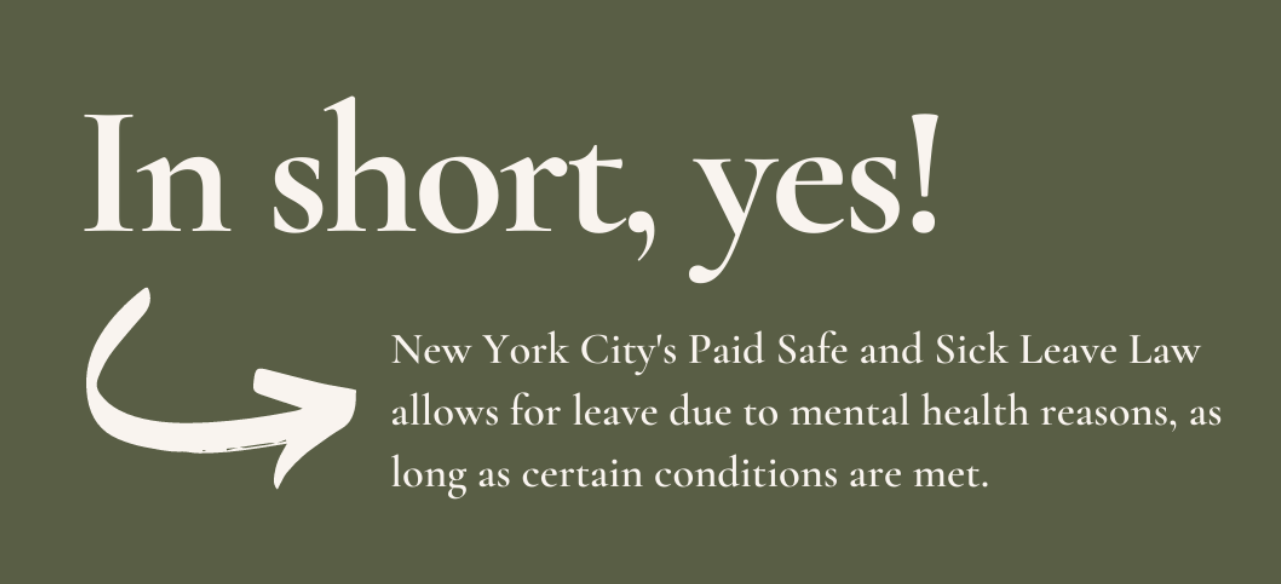How to Express Romantic Love: Effective and Heartfelt Gestures
All the world celebrates romantic love, and people from all walks of life look for ordinary moments and extraordinary ones to express love to their...
4 min read
![]() Williamsburg Therapy Group
:
Feb 16, 2023 1:24:24 PM
Williamsburg Therapy Group
:
Feb 16, 2023 1:24:24 PM

Key Takeaways:
In a world that has traditionally stigmatized mental health as a whole, taking sick leave from work for reasons like anxiety, depression, burnout, and other conditions has been a point of discussion for decades.
While we fully believe that everyone has a right to care for their mental health and that true mental health care sometimes requires days off, state laws and workplace policies often don't agree.
Many places are now putting mental health into policy because they realize how important it is to overall health and how it affects productivity at work.
Let's dive into New York's opinion on sick leave for mental health—both in policy and in culture—and explore some reasons why someone might take a mental health day.
One quick note before we begin: We're experts in mental health, not policy. Talk to your employer's HR department to confirm any information about mental health sick leave at your company.
Paid Sick Leave and Mental Health Resources on This Page
Are Paid Sick Days for Mental Health Required By Law?
Is paid mental health leave a federal law, too?
Reasons to Take a Mental Health Day
Find Therapy in Brooklyn, New York

In New York City, yes. If certain conditions are met, you have the right to take paid time off from work for mental health reasons. Depending on the size of your employer, you may be eligible to accrue 40 or 56 hours of paid sick leave per year.
In 2014, New York City introduced and passed the Earned Safe and Sick Time Act, requiring many employers to provide paid sick time for their employees. The coverage provided under this law extends to mental health conditions.
In short, if you are employed within the city of New York and need time off to address a mental illness condition, you may be able to take paid, protected leave.
In truth, even before the passage of ESSTA, many NYC employers already offered mental health leave hours to their employees. And nowadays, many offer more mental health leave time than is required by law. Check with your employer's HR department to discuss your options.
Safe leave is an addendum to ESSTA that requires employers to provide paid time off for employees who need to take steps to protect themselves after an act or threat of a number of traumatic situations, including:
This addendum also covers paid leave for employees with family members who have experienced these situations.
If the business you work for employs five or more people and operates in New York City, it is required to give you 40 hours of paid sick leave per year.
If it employs 100 or more people, it's required to give you 56 hours of paid sick leave per year.
Yes. Every 30 hours of work during the calendar year yields one paid sick leave hour.
Only employees who work more than 80 total hours per year are eligible for ESSTA sick leave.
No, but unpaid leave is. The Family and Medical Leave Act (FMLA) covers up to 12 weeks of unpaid mental healthcare leave per year.
If your employer has 50 or more employees, they are required to allow for 12 weeks of unpaid sick or family leave. You also must have worked for the employer for at least 12 months, logging at least 1,250 hours during that time.
Some states and cities have their own laws about paid leave, so if you have any questions about your eligibility or requirements, speak with your employer's HR department.
While the mental health leave policy required by city ordinance requires conditions to be met before guaranteeing paid time off, many employers allow general paid time off for any number of reasons.
Let's dive into some practical reasons why you might seek paid sick leave for your mental health.
Anxiety manifests in many different ways, but some of the most common signs are:
You may be eligible for time off for anxiety. It certainly helps if you have a diagnosis, so consider speaking with a licensed therapist if you have any of these symptoms.
Depression is characterized by, among others, the following symptoms:
Burnout is defined as an overwhelming exhaustion or ongoing apathy related to working too hard for too long. It's not technically a medical condition, but it's very real.
Some signs and symptoms of burnout include:
Keep in mind that some of these symptoms could be signs of a more serious mental illness, so talk to a doctor before assuming it's just burnout.
In some jurisdictions, therapy with a qualified and licensed therapist or psychologist is classified as an eligible medical procedure with regards to getting paid time off.
If you notice that you have any of the symptoms described above, consider asking your employer for time off in order to try therapy.
Evidence-based methods like cognitive behavioral therapy show significant rates of effectiveness.
Williamsburg Therapy Group is Brooklyn's premier therapy collective, staffed exclusively with doctoral-level psychologists.
Our highly-trained team is on-hand to help you address workplace stress, anxiety, depression, and more.
Schedule a therapy appointment online or give us a call to speak with our patient coordinator. Feeling better may be closer than you think.

All the world celebrates romantic love, and people from all walks of life look for ordinary moments and extraordinary ones to express love to their...

What is relationship burnout or relationship fatigue? Many of us have heard of burnout, but we often connect it to professional life and the problems...

In today's digital age, so many of us are locked into our mobile devices each and every day, which can have a negative impact on our mental...